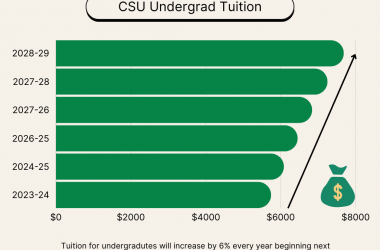A new bill approaching the governor’s desk may soon grant students more accessibility to post-graduation statistics — a tool that aims to help students find jobs and stimulate the recovering economy.
Senate Bill 1022, authored by Sen. Bob Huff (R-Diamond Bar), would require the California State University, and encourage the University of California, “to publicly provide labor market outcome information relating to their graduates,” such as salary data and distribution of employers, classified by industry, according to the bill’s text.
“Senator Huff believes that, at a minimum, policy makers in Sacramento can do something to ensure the students, have the most data and information about labor market,” said Peter DeMarco, communications director for Huff. “If you give students a picture of college graduate salary earnings and industry placement, it should be able to give students a thoughtful, more data-driven decision about where they want to go and what they want to study.”
According to the bill’s text, SB 1022 would make use of “easily understood labor market measures,” such as aggregation of the data to the system-wide level and disaggregation to the campus level and by particular areas of study, and time frames of post-graduate progress.
The California community colleges have this data for students because they have the “model” Salary Surfer website, DeMarco said. The same kind of information would benefit the students at a CSU level, he said.
DeMarco said that because the UC system is “its own independent body,” the bill encourages, but does not require, that the UC follow the same changes as the CSU.
DeMarco said that “minor” funding would power this bill at a one-time cost, ranging from $50,000, to $100,000 — a spending amount that falls within the CSU budget.
Senior mathematics education major Anastasia Kapitonova said that, although the bill has good intentions, it may not be as useful for students. “Could the money be used for something more productive?” she said.
Freshman health care administration major Marilyn Hernandez said that she thinks otherwise. “[Financial exposure] might be a problem, but the main concern is what [students] graduated from and if they succeeded.”
If passed by the end of August, the bill would require that CSU post-graduate information be made publicly available through publication on the internet of the “respective segments” no later than June 1, 2016, and updated no later than June 1 of each year consecutively.
According to the U.S. Chamber of Commerce, even with high unemployment, there are still four million unfilled jobs in the U.S. that require a bachelor’ s degree. Four out of 10 college graduates find themselves stuck in jobs that don’t require a college degree, and nearly half of recent graduates believe that they would feel better in the job market if they had pursued a different major, according to the Chamber of Commerce.
“Despite modest economic growth, the skills gap continues to be a problem in the economy,” DeMarco said. “It’s not a gap, it’s an abyss.”



